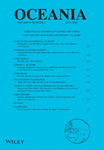
OCEANIA
Scope & Guideline
Fostering Insightful Discourse Across Disciplines
Introduction
Aims and Scopes
- Social Anthropology and Cultural Studies:
The journal emphasizes the exploration of social structures, cultural practices, and identity formations within various communities across Oceania, providing critical insights into their historical and contemporary contexts. - Decolonization and Indigenous Perspectives:
A core focus of the journal is on decolonization narratives and the agency of indigenous populations in Oceania, reflecting on the historical impacts of colonialism and contemporary movements towards autonomy and identity reclamation. - Environmental and Ecological Anthropology:
The journal addresses the intricate relationships between communities and their environments, particularly in the context of water rights, climate change, and sustainability practices, highlighting indigenous ecological knowledge. - Interdisciplinary Approaches:
OCEANIA promotes interdisciplinary methodologies, integrating anthropology with history, sociology, linguistics, and environmental studies to provide a holistic understanding of the issues facing Pacific communities. - Performance and Artistic Expressions:
The journal also explores the role of performance, art, and creativity as forms of cultural expression and resistance, investigating how these practices shape social identities and foster community resilience.
Trending and Emerging
- Decolonization and Indigenous Rights:
There is a notable increase in publications addressing decolonization processes, indigenous rights, and sovereignty movements, reflecting a growing recognition of the importance of indigenous agency and self-determination in the Pacific. - Water Rights and Environmental Justice:
Recent themes emphasize water rights, ethical relationships with water, and the broader implications of climate change on indigenous communities, underscoring the urgent need for sustainable practices and advocacy for environmental justice. - Intersections of Culture and Politics:
Emerging research explores the intersections between cultural practices and political movements, particularly how indigenous communities navigate and resist contemporary political challenges. - Resilience and Adaptation in the Face of Climate Change:
There is an increasing focus on how Pacific communities adapt to and resist the impacts of climate change, showcasing indigenous knowledge systems and practices as vital resources for resilience. - Art and Performance as Resistance:
The role of art and performance in articulating cultural identity and resistance against colonial legacies has gained traction, with scholars exploring how these forms of expression contribute to community cohesion and empowerment.
Declining or Waning
- Traditional Economic Systems:
There has been a noticeable decrease in research focusing strictly on traditional economic practices and systems, possibly overshadowed by broader discussions on globalization and modern economic challenges faced by Pacific communities. - Historical Colonial Studies:
While colonial histories remain relevant, the focus on purely historical accounts of colonialism is waning, as contemporary issues and decolonization narratives take precedence in recent publications. - Studies on Western Influence:
Research specifically examining Western cultural influence on Oceania has diminished, as scholars increasingly prioritize indigenous perspectives and self-representation over external narratives. - Language Documentation:
Although language studies have historically been a significant aspect of anthropological research in Oceania, there appears to be a decline in publications dedicated solely to linguistic documentation, as the focus shifts towards cultural and social implications of language use. - Biodiversity and Natural Resource Management:
Research directly related to biodiversity conservation and traditional natural resource management practices has seen a decline, potentially due to the growing emphasis on climate change and environmental justice.
Similar Journals

Revista Espanola de Antropologia Americana
Bridging Cultures through Scholarly ResearchRevista Española de Antropología Americana, published by UNIV COMPLUTENSE MADRID, SERVICIO PUBLICACIONES, stands as a significant contribution to the field of anthropology, particularly focusing on American societies and cultures. Since its inception in 1970, this journal has evolved, with issues currently being published until 2024, providing a platform for original research, reviews, and scholarly discourse. Despite being a Q3 category journal in the 2023 rankings, it plays a pivotal role in disseminating knowledge and stimulating academic debate within the anthropology community. With an ISSN of 0556-6533 and an E-ISSN of 1988-2718, Revista Española de Antropología Americana strives to engage researchers, professionals, and students with insightful content that reflects the dynamic nature of cultural studies. Although it operates under traditional access models, the rich array of topics covered ensures its relevance to ongoing scholarly conversation in social sciences and anthropology. Addressing a diverse array of anthropological themes, this journal is essential for anyone looking to deepen their understanding of the cultural frameworks shaping American societies.
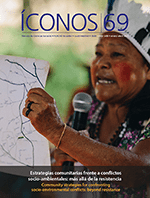
Iconos
Unlocking Knowledge: Open Access to Transformative ResearchIconos is a distinguished academic journal published by FAC LATINOAMERICANA CIENCIAS SOCIALES-FLACSO in Ecuador, with an ISSN of 1390-1249 and an E-ISSN of 1390-8065. Since its inception in 1997, Iconos has proudly maintained an open-access policy, promoting accessibility and dissemination of critical research across various disciplines. With a strong focus on Anthropology, Gender Studies, and Social Sciences, this journal has achieved a commendable standing, being categorized in the Q2 quartile in 2023 across multiple categories in these fields. Notably, it ranks #199 in Anthropology and #91 in Gender Studies, placing it in the upper percentiles of academic publishing. The journal aims to foster interdisciplinary dialogue and to illuminate socio-cultural dynamics through rigorous scholarship. With its commitment to quality, research diversity, and social relevance, Iconos serves as an essential resource for researchers, professionals, and students alike, seeking to engage with contemporary social issues from a Latin American perspective.
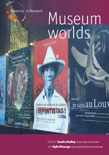
Museum Worlds
Shaping discourse in the world of museums.Museum Worlds is a distinguished academic journal published by BERGHAHN JOURNALS, dedicated to advancing scholarship in the fields of Museology and Conservation. With a strong impact within the academic community, evidenced by its 2023 Scopus rankings—#16 in Museology and #32 in Conservation—this journal offers an engaging platform for innovative research and discourse surrounding museum practices and cultural heritage. Since transitioning to Open Access in 2020, Museum Worlds has broadened its reach, making valuable insights available to researchers and practitioners globally. With its publication spanning from 2019 to 2023 and positioning in the top quartiles of respective categories, this journal is integral for those invested in the evolution of museum studies, providing a space for critical reflection, debate, and the sharing of pioneering methodologies in the stewardship of cultural institutions. Located in the heart of Brooklyn, NY, it stands as a hub for the scholarly community, inviting contributions that push the boundaries of knowledge in the ever-evolving landscape of museums.

Anthropological Notebooks
Cultivating Innovative Ideas in Contemporary AnthropologyAnthropological Notebooks, published by the SLOVENE ANTHROPOLOGICAL SOC, is a noteworthy journal within the field of anthropology. Established in Slovenia, this journal aims to provide a platform for scholarly dialogue and dissemination of anthropological research, fostering interdisciplinary approaches and global perspectives. Although it currently holds a Q4 quartile ranking in anthropology and ranks #421 out of 502 in Scopus, it serves as an essential conduit for emerging voices and innovative ideas in the discipline. Covering research published from 2010 to 2019 and from 2021 to 2024, the journal invites contributions that explore diverse cultural narratives and anthropological insights. Despite its limited open access options, Anthropological Notebooks remains a crucial resource for researchers, professionals, and students seeking to engage with contemporary anthropological discourse and enrich their understanding of human societies.

AIBR-Revista de Antropologia Iberoamericana
Innovating Perspectives in Ibero-American Cultural StudiesAIBR-Revista de Antropologia Iberoamericana is a premier scholarly journal published by the ASOC ANTROPOLOGOS IBEROAMERICANOS EN RED, dedicated to advancing research and discussion in the fields of Anthropology and Cultural Studies. Since becoming an Open Access publication in 2006, this journal has facilitated the dissemination of valuable insights and innovative perspectives, making its contributions widely accessible to scholars, professionals, and students alike. Based in Madrid, Spain, it serves as a crucial platform for anthropological research emanating from the Ibero-American context. The journal is recognized within the academic community, achieving a commendable Q2 ranking in both Anthropology and Cultural Studies categories as of 2023, and ranks favorably in Scopus, highlighting its significance and impact in the field. Researchers seeking to contribute or engage with contemporary anthropological discourse will find AIBR a critical resource for knowledge production and scholarly exchange.
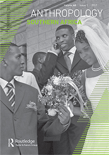
Anthropology Southern Africa
Fostering interdisciplinary dialogue in the heart of Southern Africa.Anthropology Southern Africa is a prestigious journal published by Routledge Journals, Taylor & Francis Ltd, and is dedicated to advancing the field of anthropology through rigorous scholarship and critical discourse. Established in 2013 and converging through 2024, this journal sets a high standard in its category, currently holding a Q2 classification in Anthropology and a Q1 ranking in Cultural Studies for the year 2023, ensuring its position as a significant contributor to social science research. With a robust Scopus ranking that places it in the 82nd percentile for Cultural Studies and the 67th percentile for Anthropology, Anthropology Southern Africa serves as an essential platform for researchers, professionals, and students engaged in anthropological inquiry and cultural analysis. Although it is not openly accessible, the publication prides itself on high-quality submissions that explore diverse cultural phenomena and anthropological perspectives, thereby inviting interdisciplinary engagement and fostering a global academic dialogue.
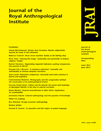
JOURNAL OF THE ROYAL ANTHROPOLOGICAL INSTITUTE
Connecting Scholars to the Heart of AnthropologyJOURNAL OF THE ROYAL ANTHROPOLOGICAL INSTITUTE, published by Wiley, stands as a prestigious platform for scholarly discourse in the field of anthropology. With an ISSN of 1359-0987 and an E-ISSN of 1467-9655, this journal has been a vital resource for researchers, professionals, and students since its inception, featuring contributions that push the boundaries of understanding in both cultural and social anthropology. The journal’s rigorous peer-review process affirms its high academic standards, reflected in its top-tier Q1 rankings in both the Anthropology and Arts and Humanities categories for 2023. With a current ranking of #78 out of 502 in Social Sciences Anthropology and #138 out of 552 in Miscellaneous Arts and Humanities, it inhabits a critical space within academia, addressing seminal issues and innovative research. While the journal is not open access, it remains accessible to those affiliated with institutions that provide subscriptions, ensuring that groundbreaking anthropological insights are disseminated widely within the academic community. As it converges from 1995 to the present, the JOURNAL OF THE ROYAL ANTHROPOLOGICAL INSTITUTE continues to shape the landscape of anthropological research, engaging a diverse readership eager to explore the intricate tapestry of human cultures.
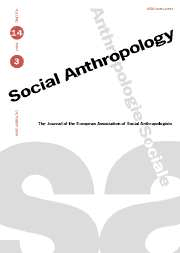
Social Anthropology
Unraveling the Threads of Social PracticeSocial Anthropology is a leading journal published by BERGHAHN JOURNALS, focusing on the diverse and dynamic field of anthropology. With an ISSN of 0964-0282 and an E-ISSN of 1469-8676, this open-access journal has been a cornerstone of scholarly communication since its inception in 1982, becoming fully accessible to the public since 2022. Situated in the United States, the journal aims to disseminate high-quality research that explores sociocultural dimensions of human behavior across various contexts, addressing pressing contemporary issues through a multidisciplinary lens. With impressive rankings, including Q2 in Anthropology and Arts and Humanities, and strong positions in Sociology and Developmental Psychology according to Scopus metrics, Social Anthropology serves as an essential platform for researchers, professionals, and students committed to advancing our understanding of social practices and cultural norms. Its commitment to fostering intellectual discourse makes it a vital resource for those seeking to deepen their knowledge and insight into the anthropological landscape.

Anthropology Today
Exploring the Depths of Human CulturesAnthropology Today, published by WILEY, is a leading peer-reviewed journal in the field of anthropology, boasting a distinguished Q1 category ranking in the 2023 evaluations and a notable position within the top 79th percentile of its discipline according to Scopus. Established in the United States, this journal offers a rich compendium of contemporary anthropological research, covering diverse topics that shape the understanding of human cultures and societies. It is recognized for its rigorous academic standards and commitment to publishing innovative studies that reflect current trends and discussions within the field. While the journal is not open access, it provides insightful articles and reviews that are indispensable for researchers, professionals, and students seeking to enhance their knowledge and stay updated with the latest anthropological findings and theoretical advancements.
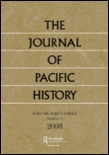
JOURNAL OF PACIFIC HISTORY
Charting the Course of Pacific Historical DiscourseJOURNAL OF PACIFIC HISTORY, published by Routledge Journals, Taylor & Francis Ltd, is a pivotal platform for advancing scholarship in the fields of cultural studies, history, sociology, and political science. With its comprehensive coverage since 1966, this journal fosters a deeper understanding of Pacific history and its implications on contemporary issues. While it currently operates under traditional access options, it remains committed to disseminating high-quality research that addresses the diverse narratives of the Pacific region. Recognized in the 2023 Scopus rankings, it holds respectable positions in the arts and humanities, alongside cultural studies, ranking within the top 40% of its category, thus affirming its significance to researchers and scholars alike. The journal's interdisciplinary scope encourages contributions that span a variety of themes and methodologies, making it an essential resource for academics, professionals, and students dedicated to the study of the Pacific.